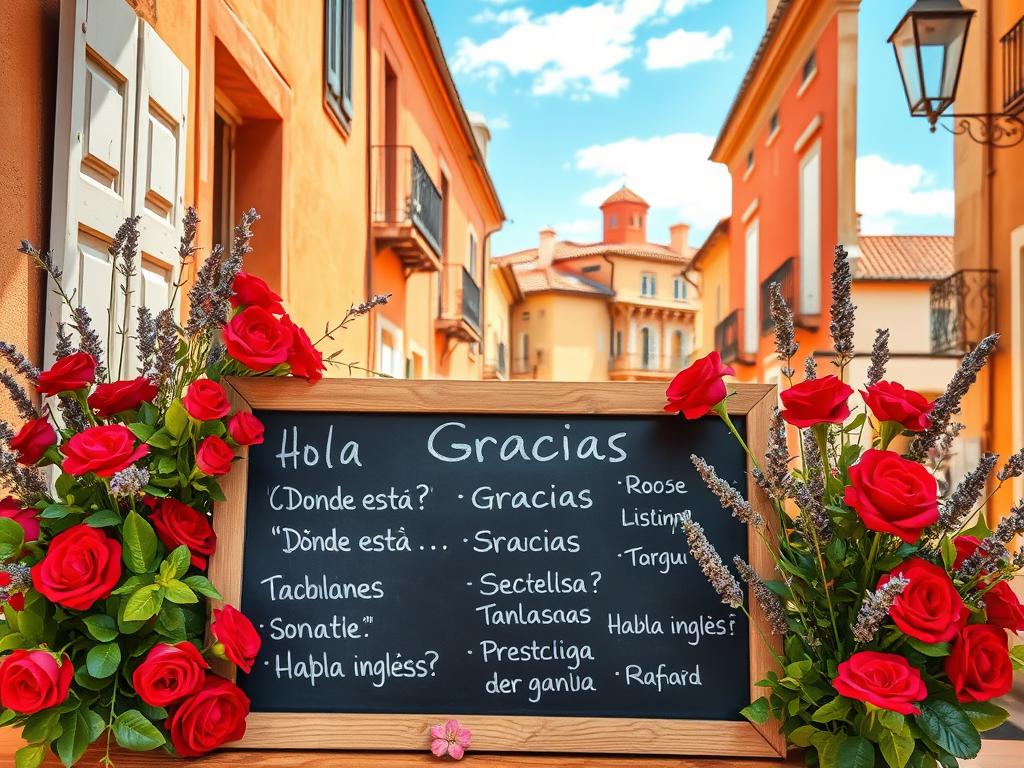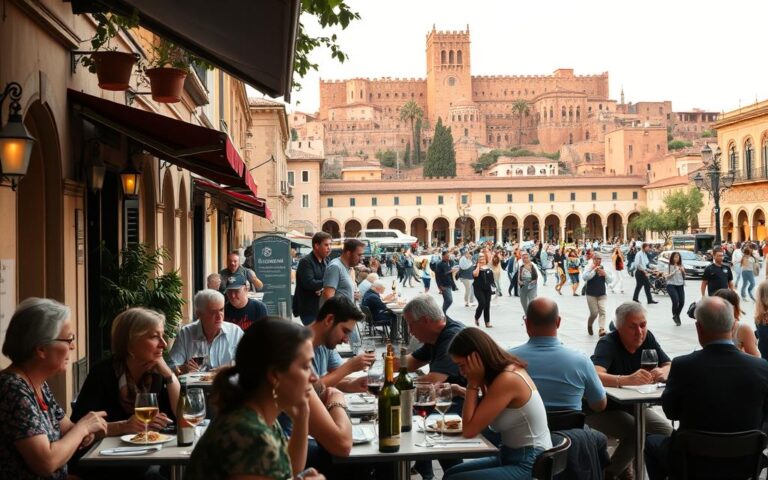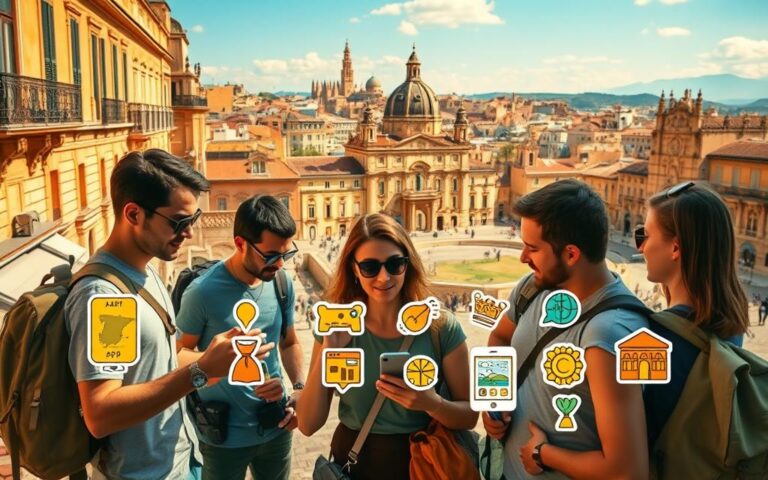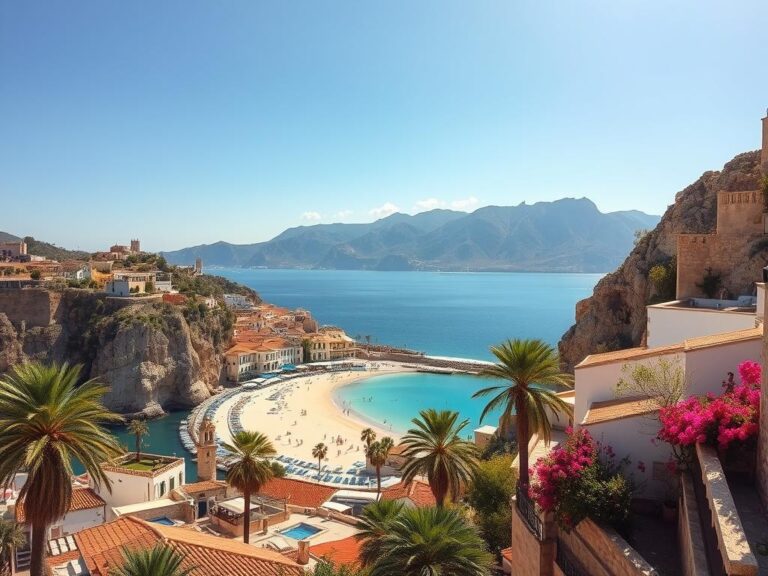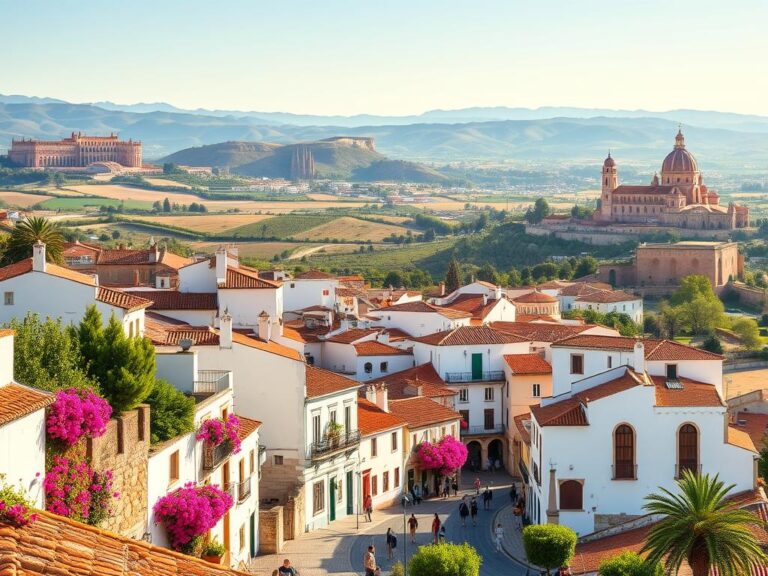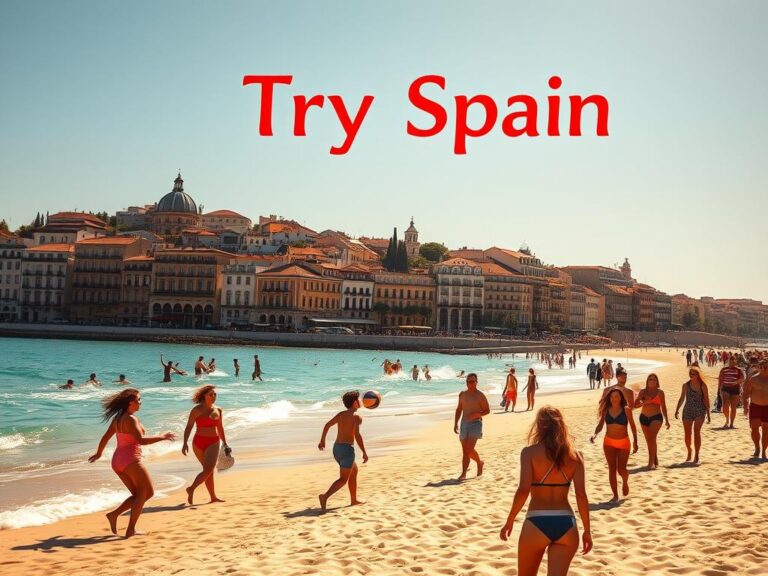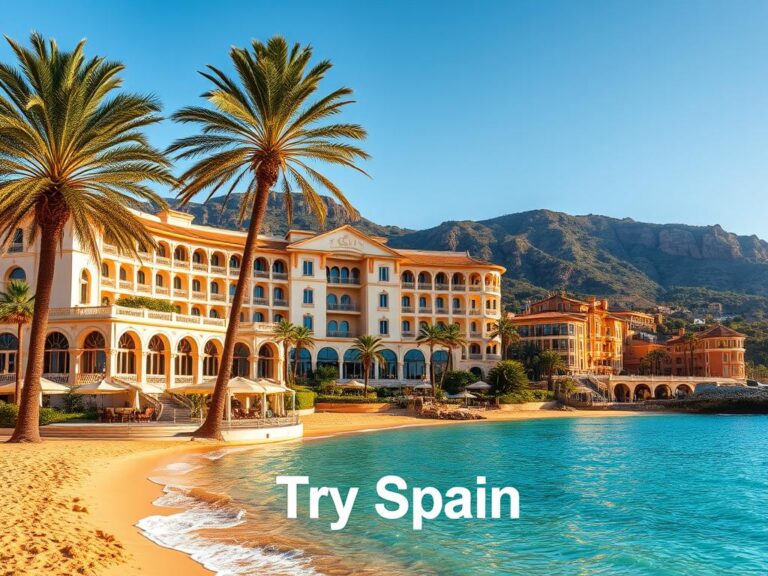Learn the Top Spanish Phrases for Your Spain Trip
Can knowing just a few key phrases in the local language really make a difference in your travel experience? The answer is a big yes. Learning essential phrases in the local language helps you navigate new places better. It also shows respect for the culture you’re visiting.
Spanish is the second most spoken language in the world. Knowing a few key expressions can greatly improve your trip to Spain. It leads to more meaningful interactions with locals and a deeper experience. In this article, we’ll look at the top phrases you need to know for a great journey.
Why Learning Spanish Phrases Enhances Your Travel Experience
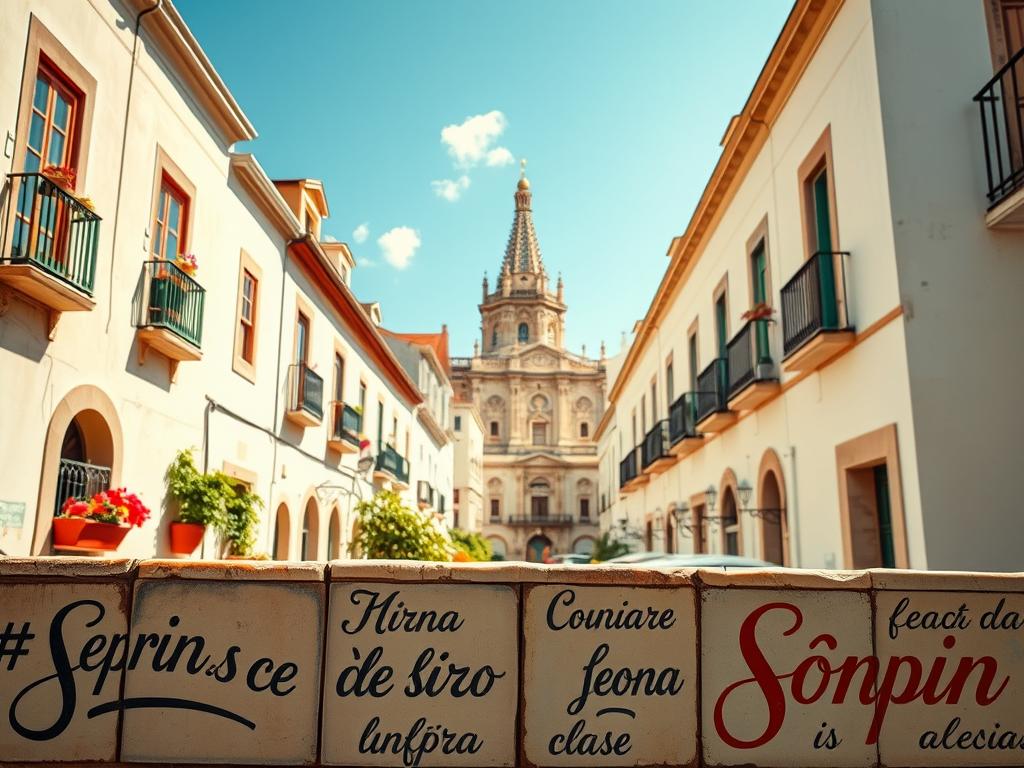
Learning Spanish phrases makes your trip to Spain more real and fun. When you speak the local language, you dive deeper into the culture and people. It’s a way to connect with them on a personal level.
Cultural Connection Through Language
Using basic Spanish for travelers, you can really talk to locals. Saying “gracias” (thank you) and “¿dónde está…?” (where is…) shows you care about their culture. This can lead to real conversations with hotel staff, restaurant workers, and street people.
Learning a few common Spanish expressions also helps you understand local customs. For example, knowing about siesta or local festivals makes your trip more interesting.
Navigating Beyond Tourist Areas
Knowing Spanish phrases for Spain lets you explore places tourists don’t go. Asking for directions or reading signs in Spanish can uncover hidden spots. This makes your trip more exciting and varied.
Also, speaking Spanish is useful when using public transport or shopping at markets. It helps you talk better with locals, making your trip more rewarding.
Earning Respect from Locals
When you learn and use basic Spanish for travelers, locals notice and appreciate it. It shows you respect their culture and community. This can make you feel welcome and have better interactions.
Plus, speaking Spanish can prevent misunderstandings that might happen with just English. It makes your trip smoother and more enjoyable.
Essential Spanish Greetings and Polite Expressions
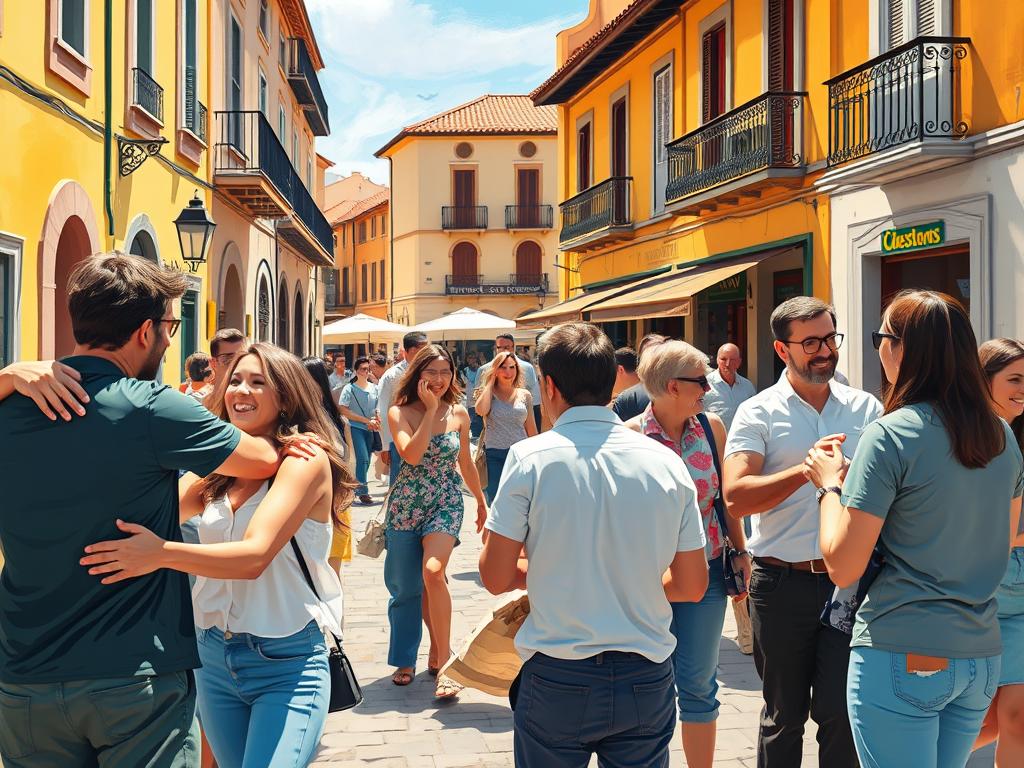
Learning essential Spanish greetings and polite expressions is vital for a respectful and enjoyable trip to Spain. A simple greeting can greatly enhance your experience.
Time-Specific Greetings
In Spain, greetings are highly valued. Using the right greeting at the right time is important. Say “Buenos días” (good morning) until lunch, “Buenas tardes” (good afternoon) until evening, and “Buenas noches” (good night) when it’s late.
Formal vs. Informal Address
Spanish has formal and informal ways to address people. Use the formal “usted” when speaking to someone you don’t know well or to someone older or in authority. For example, “¿Cómo está usted?” (how are you, formal) versus “¿Cómo estás?” (how are you, informal).
Expressing Gratitude and Courtesy
Showing gratitude is key in Spanish culture. Saying “Gracias” (thank you) or “Muchas gracias” (thank you very much) is appreciated. Also, using “Por favor” (please) and “Lo siento” (excuse me/sorry) helps you be polite in everyday situations.
By using these essential Spanish greetings and polite expressions, you show respect for the culture. You’ll also have more positive interactions with locals during your trip.
Spanish Pronunciation Guide for American Travelers
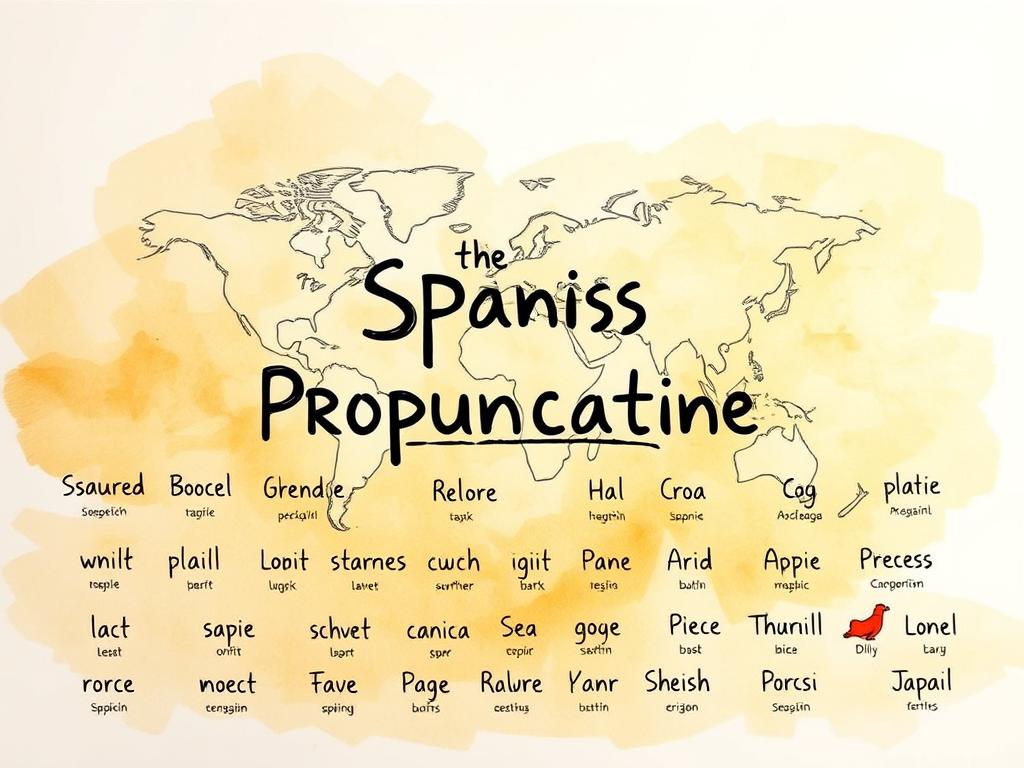
Learning Spanish pronunciation helps you connect with locals and travel better in Spain. Getting the pronunciation right makes a big difference. It lets you talk clearly and confidently.
Mastering Spanish Vowels and Consonants
Spanish vowels are key to its sound. They are clear and consistent, unlike English vowels. The vowels are a, e, i, o, u. They are pronounced as ‘a’ in ‘father,’ ‘e’ in ‘get,’ ‘i’ in ‘see,’ ‘o’ in ‘go,’ and ‘u’ in ‘you.’
Spanish consonants are mostly like English, but with some differences. For example, ‘c’ and ‘z’ sound like ‘th’ in Castilian Spanish. In Latin American Spanish, they sound like ‘s.’ The letter ‘h’ is silent, so ‘hola’ is ‘oh-lah.’
Accent Marks and Emphasis
Accent marks show stress in Spanish words. Knowing how to use them helps you say words right. Words usually stress on the second-to-last syllable if they end in a vowel or ‘n’ or ‘s.’ If they end in a consonant, stress is on the last syllable.
For example, ‘café’ stresses on the ‘e’ because of the accent mark. ‘Río’ stresses on the ‘i’ for the same reason.
Regional Pronunciation Differences in Spain
Spain has many different ways of speaking. In Catalonia, you might hear Catalan. In the Basque Country, Basque is spoken, with sounds not found in Spanish.
Even within Spanish, there are differences. For example, ‘z’ and ‘c’ sound like ‘th’ in Castilian Spanish but like ‘s’ in other places. Knowing these differences helps you understand and be understood better, no matter where you are in Spain.
Spanish Travel Phrases for Different Transportation Situations
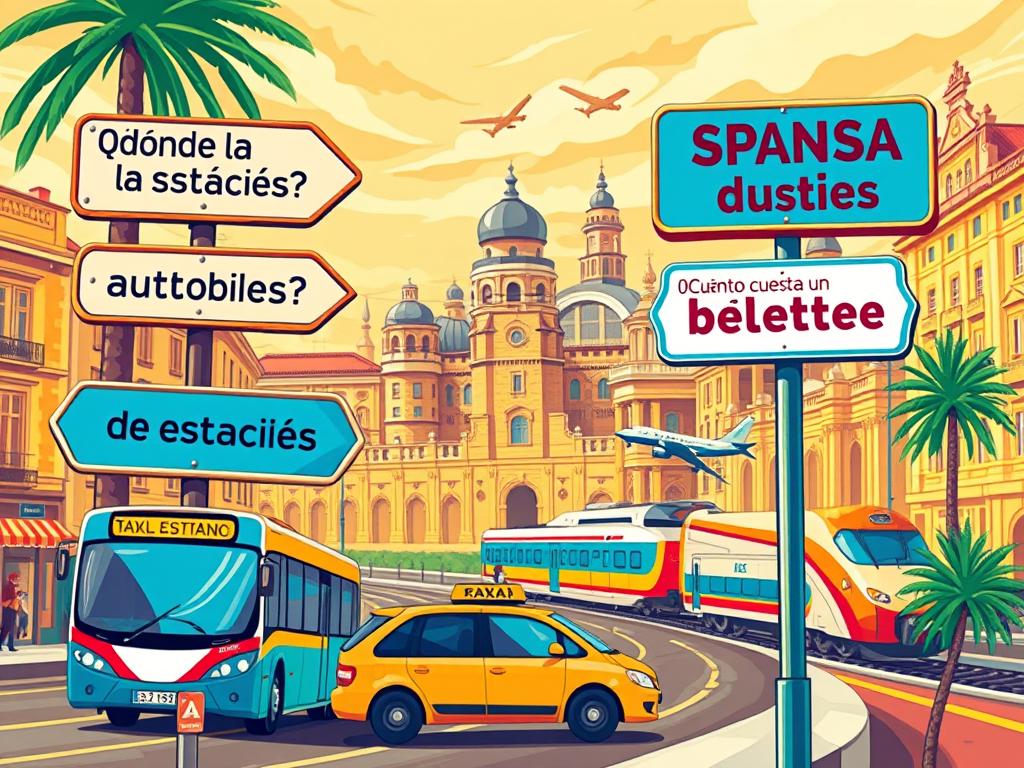
To have a smooth trip, knowing key Spanish phrases is key. Whether you’re in busy airports, train stations, or city streets, or just need directions, the right phrases can help a lot.
Navigating Airports and Train Stations
At Spanish airports or train stations, knowing phrases like “¿Dónde está…?” (where is…?) is helpful. It helps you find your gate, baggage claim, or ticket counter. You can also ask “¿Cuándo sale el próximo vuelo/tren?” (when does the next flight/train leave?) to plan your trip.
Taking Taxis and Public Transportation
Knowing how to use taxis and public transport is key for city travel. Say “¿Cuánto cuesta?” (how much does it cost?) to ask about the fare. For public transport, asking “¿Dónde está la parada de autobús más cercana?” (where is the nearest bus stop?) or “¿Cuándo pasa el próximo metro?” (when does the next subway train come?) is helpful.
Asking for Directions
Even with a map, sometimes you need to ask for directions. Start with “¿Dónde está…?” followed by the place you’re looking for. For more detailed directions, ask “¿Cómo se llega a…?” (how do you get to…?). Remember to say “Gracias” (thank you) for the help.
Mastering these Spanish travel phrases will make navigating Spain easier and more fun. It will make your trip more enjoyable.
Hotel and Accommodation Vocabulary

To have a comfortable stay in Spain, knowing hotel vocabulary is key. Learning important phrases helps you get what you need, from checking in to asking for special amenities.
Checking In and Out
When you arrive at your hotel, you’ll need to check-in (registrar). The staff will ask for your reservation and ID. When you leave, check-out (pagar la cuenta) on time to avoid extra fees.
Here are some phrases to know for check-in and check-out:
- I’d like to check-in, please. (Me gustaría registrar, por favor.)
- Can I have my key, please? (¿Puedo tener mi llave, por favor?)
- What time is check-out? (¿A qué hora es el check-out?)
Room Requests and Issues
If your room needs changes or has problems, knowing the right words helps. You can ask for more towels (toallas adicionales) or report air conditioning issues (problema con el aire acondicionado).
Nearby Amenities and Services
Knowing what’s near your hotel can make your stay better. You might want to know about local restaurants (restaurantes cercanos), laundry services (servicios de lavandería), or gyms (gimnasios).
| Service | Spanish Phrase | English Translation |
|---|---|---|
| Room Service | servicio de habitación | Room service |
| Laundry Service | servicio de lavandería | Laundry service |
| Fitness Center | gimnasio | Fitness center |
Learning these hotel and accommodation phrases makes your stay in Spain more enjoyable and stress-free.
Restaurant Spanish: Ordering Food and Understanding Menus
To enjoy Spanish cuisine, learning key phrases is key. Ordering food and understanding menus is essential. It makes dining in Spain a delightful experience.
Deciphering Spanish Menu Sections
Spanish menus can be tricky for travelers. Knowing terms like “la carta” (the menu) and “el menú del día” (the daily menu) helps. It makes choosing easier.
Menus have sections like “entrantes” (appetizers) and “postres” (desserts). Knowing these categories makes navigating menus simple.
Dietary Restrictions and Preferences
Expressing dietary needs in Spain is important. Saying “Soy vegetariano/vegano” (I am vegetarian/vegan) is key. Also, “Tengo alergia a [food]” (I am allergic to [food]) is helpful.
Ask for modifications with “Sin [ingredient], por favor” (Without [ingredient], please). This ensures your meal meets your needs.
Ordering Drinks and Paying the Bill
Ordering drinks in Spain requires the right words. Ask for “un café” (a coffee) or “una cerveza” (a beer). Remember to ask for “con hielo” (with ice) or “sin hielo” (without ice).
When paying, say “la cuenta, por favor” (the bill, please). Service is usually included, but a small tip is customary.
Shopping and Bargaining Phrases in Spanish
Shopping in Spain is more fun when you speak Spanish. You can explore local markets, fancy boutiques, or supermarkets. Knowing the right phrases can really help.
Asking About Prices and Availability
Understanding prices and what’s available is key. Here are some phrases to help:
- ¿Cuánto cuesta? – How much does it cost?
- ¿Tiene…? – Do you have…?
- ¿Cuántos hay? – How many are there?
- ¿Está disponible? – Is it available?
Size, Color, and Quality Inquiries
When shopping, you might ask about size, color, and quality. Here are some phrases to ask:
- ¿Qué talla es? – What size is it?
- ¿Qué color es? – What color is it?
- ¿De qué material está hecho? – What material is it made of?
- ¿Es de buena calidad? – Is it of good quality?
Negotiating at Markets
Negotiating prices is common at Spanish markets. Here are some phrases for effective bargaining:
- ¿Podría darme un descuento? – Could you give me a discount?
- Me gusta, pero es un poco caro. – I like it, but it’s a bit expensive.
- ¿Cuánto es lo mínimo que está dispuesto a vender? – What’s the lowest you’re willing to sell for?
- Lo tomaré si me hace un buen precio. – I’ll take it if you give me a good price.
Using these phrases, you can shop with confidence. You’ll have a better time at Spanish markets and stores.
Useful Spanish Phrases for Tourists at Popular Attractions
Exploring Spain’s attractions is more fun with some Spanish phrases. Whether you’re at famous museums, beautiful beaches, or cultural events, speaking Spanish makes your trip better.
Museum and Historical Site Vocabulary
Visiting museums and historical sites is a big part of Spain. Knowing some key words helps a lot. For example, “¿Dónde está…?” (where is…) helps find exhibits or areas. Knowing about different artworks or artifacts is also useful.
- Museum-related phrases:
- “¿Qué es esto?” (what is this?)
- “¿Cuándo se construyó?” (when was it built?)
- “¿Quién es el artista?” (who is the artist?)
Beach and Outdoor Activity Terms
Spain’s beaches and outdoor fun are famous. Knowing the right words makes these activities better. For example, asking about the nearest beach or water sports is helpful.
- Beach and outdoor phrases:
- “¿Dónde está la playa más cercana?” (where is the nearest beach?)
- “¿Qué actividades acuáticas ofrecen?” (what water activities do you offer?)
- “¿Cuánto cuesta el alquiler de equipo?” (how much does equipment rental cost?)
Cultural Events and Festivals
Spain’s cultural events and festivals are lively. Learning some phrases for these events is very helpful. You might ask about event schedules or the meaning of traditions.
- Cultural event phrases:
- “¿Cuál es el horario de los eventos?” (what is the schedule of events?)
- “¿Qué significa esta tradición?” (what does this tradition mean?)
- “¿Dónde puedo comprar entradas?” (where can I buy tickets?)
Using these Spanish phrases at tourist spots makes your Spain trip more fun and memorable.
Emergency and Health-Related Spanish Phrases
Knowing Spanish in emergencies or health issues can make your trip better. It helps you handle tough situations better.
Medical Assistance and Pharmacy Vocabulary
In a medical emergency, asking for help is key. Important phrases include “¡Ayuda!” (help!), “¿Dónde está el hospital?” (where is the hospital?), and “Necesito un médico” (I need a doctor). At the pharmacy, you might need to ask for certain items or info.
- Necesito una farmacia (I need a pharmacy)
- ¿Tiene algo para… (do you have something for…)
- Estoy alérgico a… (I am allergic to…)
Knowing these phrases can help you get the medical help or medication you need.
Reporting Problems to Authorities
If you face any issues or need to report a problem, clear communication is key. Useful phrases include:
- Quiero denunciar un incidente (I want to report an incident)
- He perdido mi pasaporte (I have lost my passport)
- Me han robado (I have been robbed)
Reporting incidents or issues quickly can solve problems faster.
Insurance and Documentation Terms
Having the right insurance and documents is important in emergencies. Key terms to know are:
| English | Spanish |
|---|---|
| Insurance | Seguro |
| Policy Number | Número de póliza |
| Medical Card | Tarjeta médica |
Understanding these terms can make dealing with insurance and medical documents easier.
Making Friends: Social Spanish for Travelers
To really get into the Spanish culture, learning some social Spanish is key. When you travel to Spain, making friends with locals can make your trip unforgettable.
Starting Conversations with Locals
Starting a chat with locals is easy. Just say “¿Cómo estás?” (how are you?) or ask about their day. Phrases like “Me gusta…” (I like…) or “¿Qué te gusta?” (what do you like?) can spark interesting conversations.
Other helpful phrases include “¿De dónde eres?” (where are you from?) and “¿Qué te parece España?” (what do you think of Spain?). These can start great talks and help you connect with locals.
Understanding Spanish Humor and Slang
Getting Spanish humor and slang can be tough, but it’s vital for social Spanish. Spaniards often use humor to start conversations. Knowing and enjoying it can make your talks more fun.
Learning common slang and expressions makes you sound more natural and friendly. Saying “¡Qué onda!” (what’s up!) or “¡Hasta luego!” (see you later!) can make your Spanish sound more real and engaging.
Expressing Opinions and Interests
Sharing your opinions and interests is important in any social setting. In Spanish, you can say “Me encanta…” (I love…) or “No me gusta…” (I don’t like…) to share your views.
For example, you might say “Me encanta la comida española” (I love Spanish food) or “No me gusta el fútbol” (I don’t like soccer). Sharing your thoughts and listening to others can help you form strong bonds with people you meet.
Regional Spanish Variations Across Spain
Exploring Spain means knowing the local Spanish differences. Spain is rich in languages and dialects. This knowledge improves your talks with locals.
Castilian vs. Catalan, Basque, and Galician
Castilian Spanish is Spain’s official language. But, many areas have their own languages too. Catalan is spoken in Catalonia, Basque in the Basque Country, and Galician in Galicia. Knowing these can help you get around better.
While Castilian is understood everywhere, local phrases show respect. Saying “Bon dia” (good morning) in Catalan is a nice start.
Region-Specific Expressions
Every region in Spain has its own words and slang. In Andalusia, “Vale” is common, like in other Spain but with an Andalusian twist. In Catalonia, “Si us plau” (please) is used often.
Adapting Your Spanish to Different Areas
Adapting your Spanish to the region you’re in is smart. Learning local phrases or knowing regional expressions is key. This makes your trip better and shows respect for the culture.
By doing this, you’ll have more meaningful talks with locals. It’s a great way to connect with the people you meet.
Digital Tools and Apps for Spanish Language Support
In today’s digital age, travelers to Spain can use many apps and tools to improve their Spanish.
These digital tools help you communicate better and enjoy your time in Spain more. They include translation apps, language learning resources, and offline phrase solutions.
Translation Apps for Travelers
Translation apps are essential for anyone visiting Spain. Here are some top picks:
- Google Translate: Translates text, speech, and images.
- iTranslate: Offers text and voice translation.
- Microsoft Translator: Translates conversations in real-time.
| App | Features | Offline Capability |
|---|---|---|
| Google Translate | Text, speech, and image translation | Yes |
| iTranslate | Text and voice translation | Yes |
| Microsoft Translator | Conversation translation | Yes |
Language Learning Resources
Language learning resources are great for learning Spanish before and during your trip.
Some top resources include:
- Duolingo: A fun app with a full Spanish course.
- Rosetta Stone: Offers interactive lessons for a fee.
- SpanishPod101: Uses podcasts for audio and video lessons.
Offline Spanish Phrase Solutions
Offline phrase solutions are perfect when you’re not connected to the internet.
Some great offline phrasebooks are:
- Spanish Phrasebook offers essential phrases and vocabulary.
- Apps like Google Translate work offline too.
Using these digital tools and apps can greatly improve your Spanish skills. This makes your trip to Spain more enjoyable.
Common Mistakes Americans Make with Spanish Phrases
When you travel to Spain, you might find it hard to communicate. Knowing the common mistakes can make your trip better. Learning about these errors helps you talk to locals more easily.
False Friends and Misinterpretations
“False friends” are words that look the same in Spanish and English but mean different things. For example, embarazada means “pregnant,” not “embarrassed.” It’s important to know these differences to avoid confusion. Here are some false friends to watch out for:
| Spanish Word | English False Friend | Actual Meaning |
|---|---|---|
| embarazada | embarrassed | pregnant |
| actual | actual | current or up-to-date |
| aspirar | aspire | to inhale or to aspire to something |
Cultural Faux Pas to Avoid
Not understanding cultural norms can lead to mistakes. In Spain, greeting with a kiss on each cheek is common. Not doing this might seem rude. Knowing these customs helps you avoid making people uncomfortable.
- Greet with a kiss on each cheek when meeting.
- Use formal titles like “señor” or “señora” until you’re invited to use first names.
- Respect siesta times and local customs.
Pronunciation Pitfalls
How you say words is very important. In Spanish, “c” and “z” sound like “th” in Castilian Spanish. This can be tricky for Americans. Practicing these sounds helps you communicate better.
To get better at pronunciation, try these tips:
- Listen to native speakers to get a feel for the rhythm and intonation of Spanish.
- Practice with a language exchange partner or tutor.
- Use language learning apps that focus on pronunciation.
Conclusion: Embracing Spain Through Its Language
Getting ready for your Spain trip? Learning some Spanish can make it better. It helps you move around, talk to people, and enjoy the food more.
Speaking Spanish shows you respect the culture and people. It makes your visit more real and fun. Whether you’re in Barcelona or Costa del Sol, locals will thank you for trying.
Learning Spanish opens up new experiences and connections. As you dive into the language and culture, you’ll see Spain’s true spirit. Your trip will be unforgettable.

